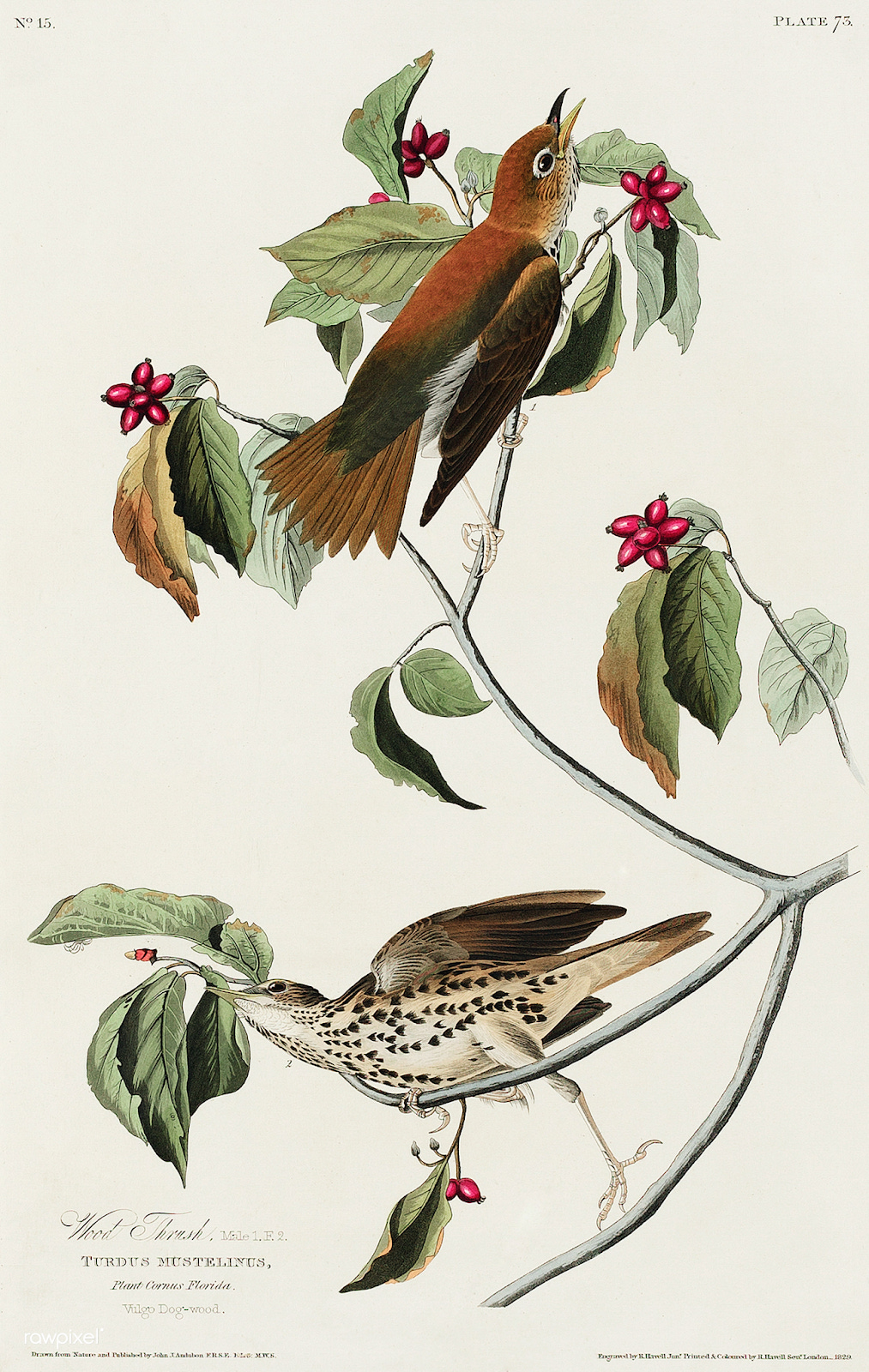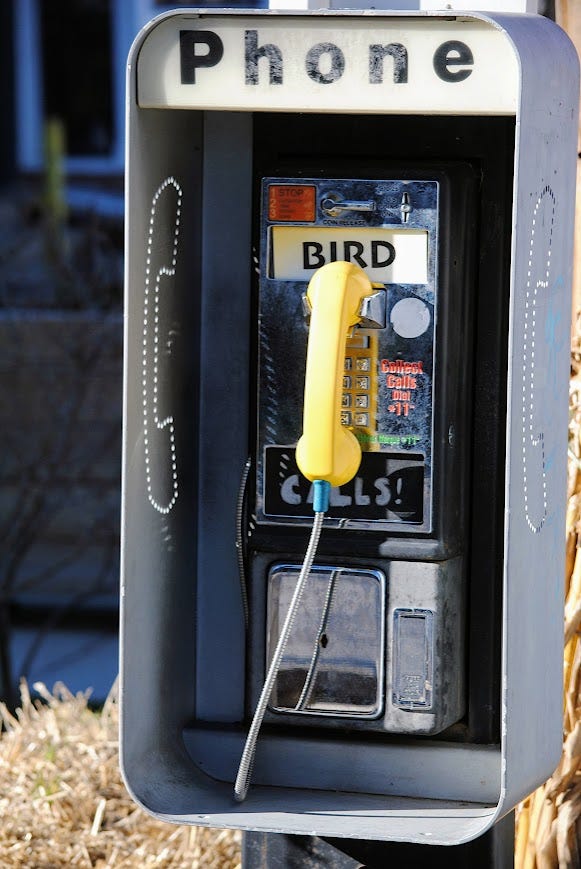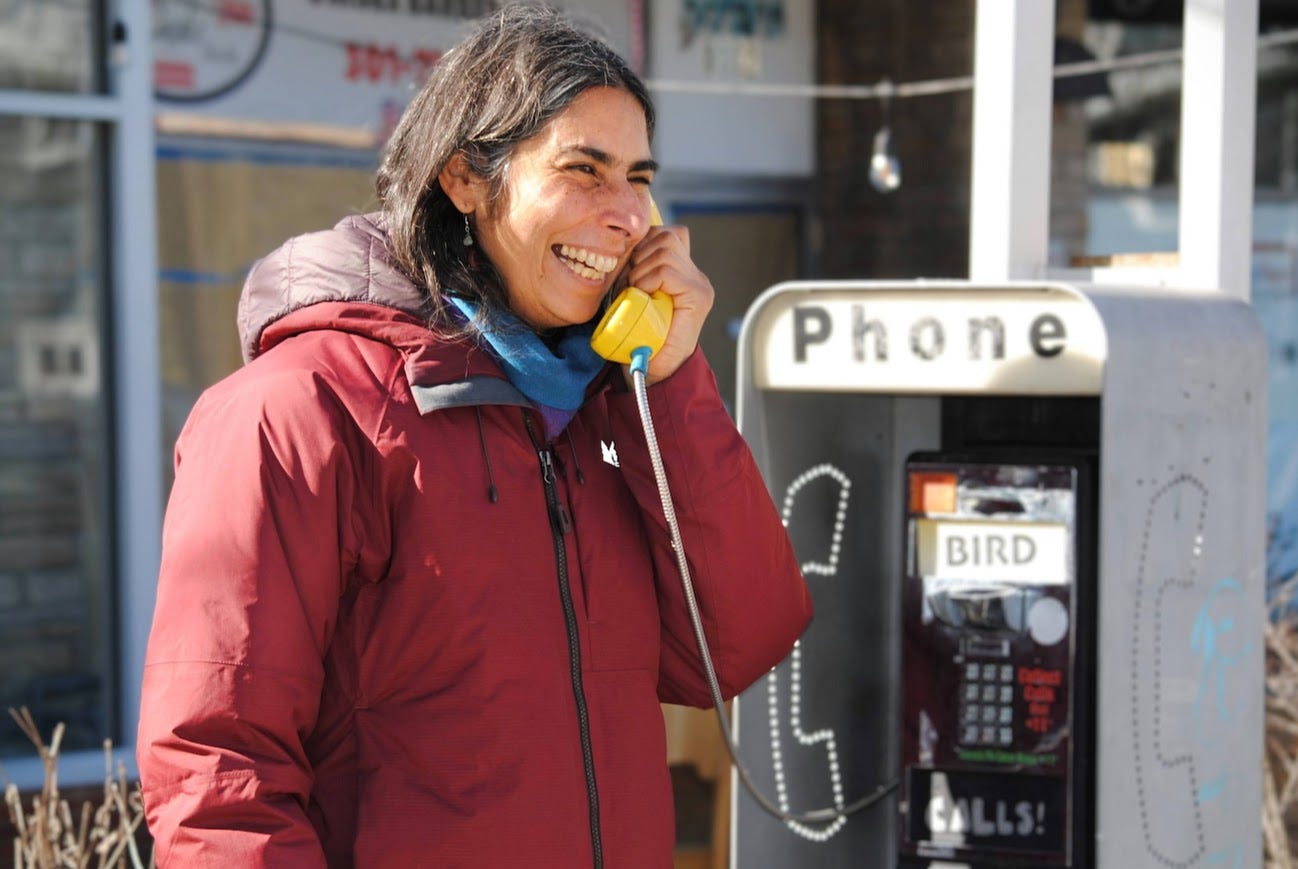Did you know the wood thrush is the official bird of Washington, DC? Or that it was one of John James Audubon’s favorite birds – not for its plumage, but for its song?

I learned these tidbits from a charming contraption planted, appropriately, at 8000 Flower Avenue in Takoma Park, MD.
Other welcome additions to my avian knowledge: pileated woodpeckers drum on trunks not just to access bugs, but also to communicate. And TV soundtracks regularly use the calls of red-tailed hawks to stand in for bald eagles. Turns out our proud national symbol makes a cute but somewhat wimpy-sounding squeak, so editors do a voice-over.
The contraption in question is the BirdCalls Phone. It’s a payphone cleverly MacGyvered to play bird songs.
For reals. No quarters required. You just pick up the goldfinch-yellow handset, press a number and listen. Dial 1 for the virtuoso mimicry of a mockingbird. Hit 3 for the reedy whistles of wood ducks. Try 7 for the jaunty chitters of belted kingfishers. And so on. I’m pretty sure there’s a money-back guarantee on smiles.
The mastermind behind the magic is musician, audio producer and all-around sound explorer David Schulman. David and his BirdCalls Phone have been featured recently in the likes of The Washington Post and NPR, but even so he graciously agreed to chat with The Bees’ Knees.
When the city of Takoma Park sought proposals to design an art installation in a small lot near a bus stop, David’s longstanding appreciation for payphones and love of bird songs sparked a winning idea. “I’ve always really liked payphones,” he says. “The mechanics of them…the low-fi aspect.” As someone with experience in radio broadcasting, he adds, “There’s also something really cool about a box like this. Only one person at a time can listen.” Over the years, David had worked professionally with the Cornell Lab of Ornithology and its Macaulay Library, which calls itself "the world’s premier scientific archive of natural history audio, video, and photographs,” so he knew where to find good sound.
He selected birds that are local to Takoma Park, make beautiful sounds, and offer interesting stories. One colorful entry is not exactly native, but still very much a local legend: as the story goes, Roscoe the Rooster would escape his coop and go strutting about Old Town, ever eluding the hapless animal control officers assigned to capture him. Takoma Park residents embraced his scofflaw attitude and have venerated him since. (Dial 5 for rooster.)
I had always assumed bird songs were instinctive. Scientists have learned, though, that birds learn to sing in the same way humans learn to talk: they listen to adults, babble, experiment, practice, and eventually become fluent. Bird songs are considered the nearest analogy to language in the animal kingdom. Since bird songs are learned, they’re passed down through generations like culture. They can also vary over geography. Black capped chickadees on the island of Martha’s Vineyard, for example, sing a different tune than their counterparts in mainland Massachusetts.
Some birds are amazing mimics. A crested lark in southern Germany learned to imitate the command whistles a sheep farmer used with his herding dogs. The lark was so convincing that the dogs dutifully obeyed its whistles, including “run ahead!,” “fast!” “halt!” and “come here!” Gotta assume that situation was a bit confusing for everyone involved.
Bird songs amaze and delight. The BirdCalls Phone captures that, with both whimsy and poignancy. Amid the smiles, it’s hard not to reflect on the parallels between payphone extinction and the precipitous decline of songbird numbers globally.
Speaking of which, today marks the launch of 2024’s Great Backyard Bird Count, an initiative of the Cornell Lab, Audubon, and Birds Canada. It runs February 16-19 and anyone can participate. You sit outside for a minimum of 15 minutes, identify any birds you see or hear, and submit your findings to the Merlin Bird ID or eBird apps (which can also help you with the identification). No prior expertise is required. Try it! You’ll be helping researchers and advocates design effective bird protection strategies.
If you’re in or near Takoma Park, visit the BirdCalls Phone. It'll brighten your day. And if you think your community could use its own singing payphone (hint: it could), reach out to birdcalls.studio.
Today’s Bees’ Keys comes to us courtesy of the BirdCalls Phone. There’s no video, so I invite you to don headphones, put your feet up, and close your eyes while you listen.
If you live in the DC vicinity and could use assistance with sustainable landscaping, visit Bees’ Knees Design. I’d be happy to help you.
Resource
Jennifer Ackerman, The Genius of Birds, Penguin Press, 2016.







I think mockingbirds speak to specific birds in their neighborhood, working their way around the yard, addressing each individual, demanding they respect their youngsters.
Also, identifying birds from a mockingbird’s calls is a fun challenge.